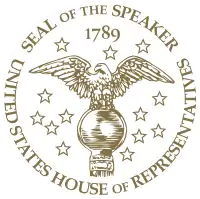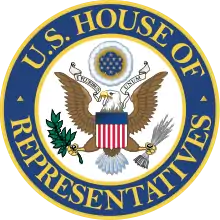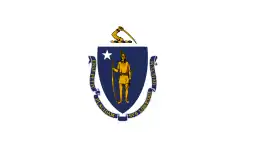Tip O'Neill
Thomas Phillip "Tip" O'Neill Jr. (December 9, 1912 – January 5, 1994) was an American politician who served as the 47th Speaker of the United States House of Representatives from 1977 to 1987, representing northern Boston, Massachusetts, as a Democrat from 1953 to 1987. The only Speaker to serve for five complete consecutive Congresses, he is the third longest-serving Speaker in American history after Sam Rayburn and Henry Clay in terms of total tenure and longest-serving in terms of continuous tenure (Rayburn and Clay served multiple terms in the Speakership).
Tip O'Neill | |
|---|---|
.jpg.webp) O'Neill in 1978 | |
| 47th Speaker of the United States House of Representatives | |
| In office January 4, 1977 – January 3, 1987 | |
| Preceded by | Carl Albert |
| Succeeded by | Jim Wright |
| Leader of the House Democratic Caucus | |
| In office January 4, 1977 – January 3, 1987 | |
| Preceded by | Carl Albert |
| Succeeded by | Jim Wright |
| House Majority Leader | |
| In office January 3, 1973 – January 3, 1977 | |
| Deputy | John J. McFall |
| Speaker | Carl Albert |
| Preceded by | Hale Boggs |
| Succeeded by | Jim Wright |
| House Majority Whip | |
| In office January 3, 1971 – January 3, 1973 | |
| Leader | Hale Boggs |
| Preceded by | Hale Boggs |
| Succeeded by | John J. McFall |
| Member of the U.S. House of Representatives from Massachusetts | |
| In office January 3, 1953 – January 3, 1987 | |
| Preceded by | John F. Kennedy |
| Succeeded by | Joseph P. Kennedy II |
| Constituency | 11th district (1953–1963) 8th district (1963–1987) |
| Speaker of the Massachusetts House of Representatives | |
| In office 1949–1953 | |
| Preceded by | Frederick Willis |
| Succeeded by | Charles Gibbons |
| Minority Leader of the Massachusetts House of Representatives | |
| In office 1947–1949 | |
| Preceded by | John Flaherty |
| Succeeded by | Charles Gibbons |
| Member of the Massachusetts House of Representatives | |
| In office 1937–1953 | |
| Personal details | |
| Born | Thomas Phillip O'Neill Jr. December 9, 1912 Cambridge, Massachusetts, U.S. |
| Died | January 5, 1994 (aged 81) Boston, Massachusetts, U.S. |
| Resting place | Mount Pleasant Cemetery, Harwich Port, Massachusetts, U.S. |
| Political party | Democratic |
| Spouse(s) | Mildred Miller (m. 1941) |
| Children | 5, including Thomas |
| Education | Boston College (BA) |
Born in North Cambridge, Massachusetts, O'Neill began campaigning at a young age, volunteering for Al Smith's campaign in the 1928 presidential election. After graduating from Boston College, O'Neill won election to the Massachusetts House of Representatives, where he became a strong advocate of Franklin D. Roosevelt's New Deal policies. He became Speaker of the Massachusetts House of Representatives in 1949 and won election to the United States House of Representatives in 1952 to the seat vacated by John F. Kennedy.
In the House, O'Neill became a protege of fellow Massachusetts Representative John William McCormack. O'Neill broke with President Lyndon B. Johnson on the Vietnam War in 1967 and called for Richard Nixon's resignation in light of the Watergate scandal. He quickly moved up the leadership ranks in the 1970s, becoming House Majority Whip in 1971, House Majority Leader in 1973, and Speaker of the House in 1977. With the election of President Jimmy Carter, O'Neill hoped to establish a universal health care system and a guaranteed jobs program. However, relations between Carter and Congress collapsed, and the Democrats lost control of the presidency in the 1980 presidential election. O'Neill became a leading opponent of Republican President Ronald Reagan's conservative domestic policies. O'Neill and Reagan found more common ground in foreign policy, fostering the Anglo-Irish Agreement and implementing the Reagan Doctrine (despite considerable opposition to Reagan's support for the Contras in Nicaragua) in the Soviet–Afghan War.
O'Neill retired from Congress in 1987 but remained active in public life. He published a best-selling autobiography and appeared in several commercials and other media. He died of cardiac arrest in 1994.
Early life and education
O'Neill was the third of three children born to Thomas Phillip O'Neill and Rose Ann (née Tolan) O'Neill in the Irish middle-class area of North Cambridge, Massachusetts, known at the time as "Old Dublin." His mother died when he was nine months old, and he was raised largely by a French-Canadian housekeeper until his father remarried when he was eight. O'Neill Sr. started out as a bricklayer, but later won a seat on the Cambridge City Council and was appointed Superintendent of Sewers. During his childhood, O'Neill received the nickname "Tip" after the Canadian baseball player James "Tip" O'Neill.[1] He was educated in Roman Catholic schools, graduating in 1931 from the now defunct St. John High School in Cambridge, where he was captain of the basketball team; he was a lifelong parishioner at the school's affiliated parish church St. John the Evangelist Church. From there he went to Boston College, from which he graduated in 1936.
Entry into politics
O'Neill first became active in politics at 15, campaigning for Al Smith in his 1928 presidential campaign. Four years later, he helped campaign for Franklin D. Roosevelt. As a senior at Boston College, O'Neill ran for a seat on the Cambridge City Council, but lost; his first race and only electoral defeat. The campaign taught him the lesson that became his best-known quote: "All politics is local."[2]
After graduating in 1936, O'Neill was elected at the age of 24 to the Massachusetts House of Representatives, aided by tough economic times among his constituents; the experience made him a strong advocate of the New Deal policies of Roosevelt, which were just then coming to an end. His biographer John Aloysius Farrell said his background in Depression-era working-class Boston, and his interpretation of his Catholic faith, led O'Neill to view the role of government as intervening to cure social ailments. O'Neill was "an absolute, unrepentant, unreconstructed New Deal Democrat," Farrell wrote.[3]
In 1949, he became the first Democratic Speaker of the Massachusetts House of Representatives in its history. He remained in that post until 1952, when he ran for the United States House of Representatives from his home district.
U.S. House of Representatives
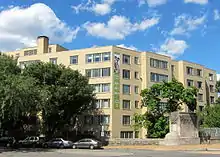
O'Neill was elected to the congressional seat vacated by Senator-elect John F. Kennedy in 1952. He would be reelected 16 more times, never facing serious opposition. His district, centered around the northern half of Boston, was originally numbered as the 11th District, but became the 8th District in 1963.
During his second term in the House, O'Neill was selected to the House Rules Committee where he proved a crucial asset for the Democratic leadership, particularly his mentor, fellow Boston congressman and later Speaker, John William McCormack.[4] O'Neill voted in favor of the Civil Rights Acts of 1957,[5] 1960,[6] 1964,[7] and 1968,[8] and the Voting Rights Act of 1965.[9]
After wrestling with the issues surrounding the Vietnam War, in 1967 O'Neill broke with President Lyndon B. Johnson and came out in opposition to America's involvement.[3] O'Neill wrote in his autobiography that he also became convinced that the conflict in Vietnam was a civil war and that US involvement was morally wrong. While the decision cost O'Neill some support among older voters in his home district, he benefited from new support among students and faculty members at the many colleges and universities there. In the House of Representatives itself, O'Neill picked up the trust and support of younger House members who shared his antiwar views, and they became important friends who contributed to O'Neill's rise through the ranks in the House.[4]
In 1971, O'Neill was appointed Majority Whip in the House, the number three position for the Democratic Party in the House. Two years later, in 1973, he was elected House Majority Leader, following the disappearance of a small plane carrying Majority Leader Hale Boggs and Congressman Nick Begich in Alaska. As Majority Leader, O'Neill was the most prominent Democrat in the House to call for the impeachment of President Richard M. Nixon in light of the Watergate scandal.
Speaker of the House
_-_USNWR.jpg.webp)
As a result of the Tongsun Park influence-peddling scandal, House Speaker Carl Albert retired from Congress and O'Neill was elected Speaker in 1977, the same year Jimmy Carter became President.
Nursing home scandal
Tongsun Park had not directly paid O'Neill, although Park's parties in his honor and a new scandal involving a nursing home O'Neill invested $5,000 in during a small business loan in violation of Federal law raised questions of impropriety, but did not prevent his re-election.[10]
Carter administration
With substantial majorities in both houses of Congress and control of the White House, O'Neill hoped that Democrats would be able to implement Democratic-favored legislation, including universal health care and guaranteed jobs programs. The Democrats, however, lacked party discipline, and while the Carter administration and O'Neill started out strong with the passage of ethics and energy packages in 1977, there were major stumbles. Troubles began with Carter's threats to veto a water projects bill, a pet project of many members of Congress. O'Neill and other Democratic leaders were also upset by Carter's appointments of a number of his fellow Georgians, whom O'Neill considered arrogant and parochial, to federal offices and White House staff.
O'Neill was also put off by Carter's frugal behavior in cutting executive staff and reducing the scale of White House entertaining. Carter, a Southern Baptist, even ended the practice of serving alcohol other than beer and wine at the White House. As Carter's term began in early 1977, Democratic leaders on Capitol Hill were invited to the White House for a breakfast with the new President, where Carter served them sugar cookies and coffee. O'Neill, a man of expansive appetite, expected the until-then-traditional eggs and sausage. He looked across the table at Carter and said, "Mr. President... you know, we won the election." Carter was a reform-minded executive who often clashed with O'Neill on legislation. The Speaker wanted to reward loyal Democrats with rewarding projects at a time when Carter wanted to reduce government spending. A continuing weak economy and the Iran hostage crisis made prospects bleak for Carter and the Democrats in the 1980 congressional and presidential elections.
Reagan administration
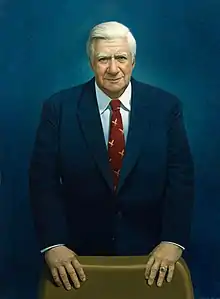
O'Neill was a leading opponent of the Reagan administration's domestic and defense policies. Following the 1980 election, with the U.S. Senate controlled by Republicans, O'Neill became the leader of the congressional opposition. O'Neill even went as far as calling Ronald Reagan "the most ignorant man who had ever occupied the White House".[4] O'Neill also said that Reagan was "Herbert Hoover with a smile" and "a cheerleader for selfishness." He also said that Reagan's policies meant that his presidency was "one big Christmas party for the rich." Privately, O'Neill and Reagan were always on cordial terms, or as Reagan himself put it in his memoirs, they were friends "after 6PM". O'Neill in that same memoir when questioned by Reagan regarding a personal attack against the President that made the paper, explained that "before 6PM it's all politics".[11] Reagan once compared O'Neill to the classic arcade game Pac-Man in a speech, saying that he was "a round thing that gobbles up money". He also once joked he had received a valentine card from O'Neill: "I knew it was from Tip, because the heart was bleeding."
O'Neill, however, gave tacit approval to Democratic Congressman Charlie Nesbitt Wilson to implement the Reagan Doctrine in the Soviet-Afghan war. Wilson's position on the appropriations committees, and his close relations with CIA officer Gust Avrakotos, allowed him to steer billions of dollars to the Mujahideen through the CIA and Zia ul-Haq's ISI.[12]
There was some contention about constitutional order of succession, which involved O'Neill, when Reagan was shot in March 1981. Then-Secretary of State Alexander Haig famously said he was "in control here," in response to a question as to who was in charge (with the president under anesthesia and Vice President George Bush traveling), but it was later pointed out that O'Neill was next in line after Bush. Reagan was only under for a few hours, and no formal invocation of the line of succession took place.
Northern Ireland
One of O'Neill's greatest accomplishments as Speaker involved Northern Ireland. O'Neill worked with fellow Irish-American politicians New York Governor Hugh Carey, Senator Edward Kennedy, and Senator Daniel Patrick Moynihan to craft a peace accord between the warring factions. Beginning with the "Saint Patrick's Day declaration" in 1977, denouncing violence in Northern Ireland and culminating with the Irish aid package upon the signing of the Anglo-Irish Agreement in 1985, the "Four Horsemen" as they were called, convinced both Carter and Reagan to press the British government on the subject.[13][14] In 1981, O'Neill also created the Friends of Ireland with Kennedy and Moynihan, an organization to promote peace in Northern Ireland.[15]
O'Neill was made an honorary Irish citizen (an honor granting legally full citizenship) by the Republic of Ireland in 1986.[16][17]
Post-speakership
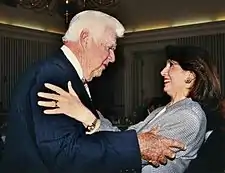
After retiring from Congress in 1987, O'Neill published his autobiography, Man of the House. It was well received by critics, and became a national best-seller. The book also helped turn the former Speaker into a national icon, and O'Neill starred in a number of commercials, including ones for Trump Shuttle, Commodore Computers, Quality International Budget Hotels, and one for Miller Lite, starring in one with Bob Uecker.
In 1987 he received the Freedom Medal.
On November 18, 1991, O'Neill was presented with the Presidential Medal of Freedom by President George H. W. Bush.[18]
Later on in retirement, O'Neill, who suffered from colon cancer, made public service advertisements about cancer in which he joined athletes and movie stars in talking candidly about having the disease.
In popular culture
O'Neill's emergence as a cultural figure was not restricted to commercials. Four years before his retirement, he had a cameo role in the February 17, 1983, episode of Cheers entitled "No Contest", which featured him ducking into the bar to escape Diane Chambers who pestered him on the street about his political ideals.[19][20] The show, which was ranked 60th in the Nielsen ratings at that time, jumped 20 places the following week. He appeared in an episode of the NBC sitcom Silver Spoons, which featured him delivering a mock press conference praising recurring character Freddy Lippincottleman's efforts on behalf of the homeless.[21] O'Neill also made a brief appearance in the 1993 film Dave as himself, assessing the work of the fictional American President in the movie. He also did narration for a segment of the Ken Burns series Baseball in which O'Neill, a lifelong Red Sox fan, read The Boston Globe from the day the Red Sox won the 1918 World Series.
In the comic strip Shoe, the character Sen. Batson D. Belfry is modelled after O'Neill.
Personal life
O'Neill resided on 26 Russell Street in North Cambridge, although he had lived as a child around the corner on Orchard St. He had a vacation home on Woodland Rd. near Bank Street Beach in Harwich Port, Massachusetts.[22] His wife was Mildred "Millie" Anne Miller (1914–2003). They had five children. His oldest son and namesake, Thomas P. O'Neill III, a former Lieutenant Governor of Massachusetts, works in public relations in Boston. Another son, Christopher, is a Washington lawyer. His third son, Michael, is deceased; daughter Susan has a business in Washington DC, and the other daughter, Rosemary, is a political officer for the State Department.
In 1980, he was awarded the Laetare Medal by the University of Notre Dame, considered the most prestigious award for American Catholics.[23]
Death and legacy
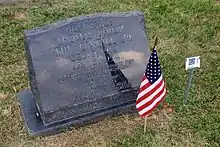
O'Neill died of cardiac arrest on January 5, 1994, survived by his wife and their children. At his passing, President Bill Clinton said: "Tip O'Neill was the nation's most prominent, powerful and loyal champion of working people... He loved politics and government because he saw that politics and government could make a difference in people's lives. And he loved people most of all." Millie died in 2003 and is buried near her husband, at Mount Pleasant Cemetery in Harwich Port, Massachusetts.
The Thomas P. O'Neill Jr. Tunnel, built through downtown Boston as part of the Big Dig to carry Interstate 93 under Boston, was named after him. Other structures named after him include a House Office Building (now demolished), the O'Neill Branch of the Cambridge Public Library (including an outdoor mural[24]), the Thomas P. O'Neill Jr. Federal Building in Boston, a federal office building in Washington DC,[25] a golf course in Cambridge, and the main library (and the plaza in front of it) at his alma mater, Boston College.
On June 22, 2008, the play According to Tip debuted in Watertown, Massachusetts, produced by the New Repertory Theatre. The one-man biographical play, written by longtime Boston sportswriter Dick Flavin, features O'Neill telling stories of his life, from his childhood to after his retirement in politics. Tony Award winner Ken Howard played the title role in the premiere production.[26]
In December 2012, the John F. Kennedy Presidential Library and Museum hosted a forum to celebrate the centennial of O'Neill's birth.[27] O'Neill himself contributed several oral history interviews to its archives chronicling his work for the Democratic Party and friendship with President Kennedy.
References
- Hodgson, G. (7 January 1994). Obituary: Thomas P. O'Neill. The Independent (London), pp. 14.
- "Thomas P. O'Neill, Jr. Papers Biographical Note | John J. Burns Library, Boston College". Bc.edu. Archived from the original on 2010-04-14. Retrieved 2010-09-10.
- Cuomo, Mario (11 March 2001). "The Last Liberal". New York Times. Retrieved 25 September 2016.
- Tolchin, Martin (7 January 1994). "Thomas P. O'Neill Jr., a Democratic Power in the House for Decades, Dies at 81". New York Times. Retrieved 25 September 2016.
- "HR 6127. CIVIL RIGHTS ACT OF 1957". GovTrack.us.
- "HR 8601. PASSAGE".
- "H.R. 7152. PASSAGE".
- "TO PASS H.R. 2516, A BILL TO ESTABLISH PENALTIES FOR INTERFERENCE WITH CIVIL RIGHTS. INTERFERENCE WITH A PERSON ENGAGED IN ONE OF THE 8 ACTIVITIES PROTECTED UNDER THIS BILL MUST BE RACIALLY MOTIVATED TO INCUR THE BILL'S PENALTIES".
- "TO PASS H.R. 6400, THE 1965 VOTING RIGHTS ACT".
- Rawls, Wendell (April 9, 1978). "O'Neill's Business Dealings Raise Questions of Conflict and Candor". The New York Times. Retrieved February 10, 2020.
- Kornblut, Anne E. (July 29, 2006). "2008 May Test Clinton's Bond With McCain". The New York Times. Retrieved May 25, 2010.
- Charlie Wilson's War: The Extraordinary Story of the Largest Covert Operation in History, George Crile, 2003, Grove/Atlantic.
- "Thatcher Attacks INA". Irish People. 24 October 1981. Retrieved 29 July 2012.
- "Former Gov. Hugh Carey of New York passes at age 92". Irish Central. August 28, 2011. Retrieved July 29, 2012.
- Providing a Leading Voice for Human Rights and Democracy around the Globe Archived 2012-03-27 at the Wayback Machine TedKennedy.org. Retrieved: 2012-04-27.
- McDowell, Michael (30 November 2004). "Irish Nationality and Citizenship Bill 2004: Report Stage (Resumed)". Dáil debates. p. Vol.593 No.5 p.23 c.1181. Retrieved 10 September 2013.
- Anderson, Nicola (14 January 1999). "Artist made honorary citizen". Irish Independent. Retrieved 10 September 2013.
Dr Hill is just the 11th person to be awarded honorary citizenship since the foundation of the State.
- Remarks on Presenting the Presidential Medal of Freedom Awards, George H. W. Bush. 18 November 1991.
- "No Contest". IMDb. Retrieved October 1, 2017.
- "Cheers - Tip O'Neil". Retrieved October 1, 2017 – via YouTube.
- "Three Musketeers". Silver Spoons. Season 4. Episode 12. NBC. December 15, 1985.
- "Biographical Note | Thomas P. O'Neill, Jr. Papers". BC.edu. John J. Burns Library, Boston College. Archived from the original on 2010-04-14. Retrieved 2010-09-10.
- "Recipients | The Laetare Medal". University of Notre Dame. Retrieved 31 July 2020.
- http://www.davidfichter.net/images/l/Tip%20O%5c'Neill%20Mural%20(web%20size).jpg
- Hicks, Josh. "Boehner agrees with Pelosi: Name federal building after 'Tip' O'Neill". The Washington Post. Retrieved 2012-11-26.
- "According to Tip". newrep.org. New Repertory Theatre. Archived from the original on 2008-07-18. Retrieved 2008-07-18.
- "Celebrating the Life of Tip O'Neill" (PDF). John F. Kennedy Presidential Library and Museum. December 9, 2012.
Further reading
- Cooper, James (February 19, 2015). "'A Log-Rolling, Irish-American Politician, Out to Raise Votes in the United States': Tip O'Neill and the Irish Dimension of Anglo-American Relations, 1977-1986". Congress and the Presidency. 42 (1): 1–27. doi:10.1080/07343469.2014.965853.
- Farrell, John A. (2001). Tip O'Neill and the Democratic Century. Boston: Little, Brown & Co. ISBN 978-0-316-26049-7.
- O'Neill, Thomas P.; Novak, William (1987). Man of the House: The Life and Political Memoirs of Speaker Tip O'Neill. ISBN 978-0-394-56505-7.
External links
| Wikimedia Commons has media related to Tip O'Neill. |
| Wikiquote has quotations related to: Tip O'Neill |
- United States Congress. "Tip O'Neill (id: O000098)". Biographical Directory of the United States Congress. Retrieved May 15, 2009.
- George Bush Presidential Library and Museum - Remarks on Presenting the Presidential Medal of Freedom Awards
- Biographer John A. Farrell's remarks on O'Neill, JAFarrell.com
- Appearances on C-SPAN
- Booknotes interview with Gary Hymel on All Politics Is Local and Other Rules of the Game, January 23, 1994
- Booknotes interview with John Farrell on Tip O'Neill and the Democratic Century, May 20, 2001
- "Famous folks from Cambridge: Tip O'Neill". Boston.com. 21 November 2011. Archived from the original on 13 June 2012. Retrieved 1 January 2013.
- Thomas P. O'Neill Papers at John J. Burns Library, Boston College
